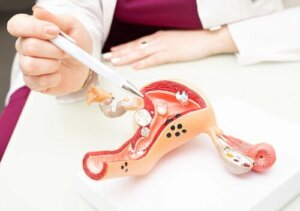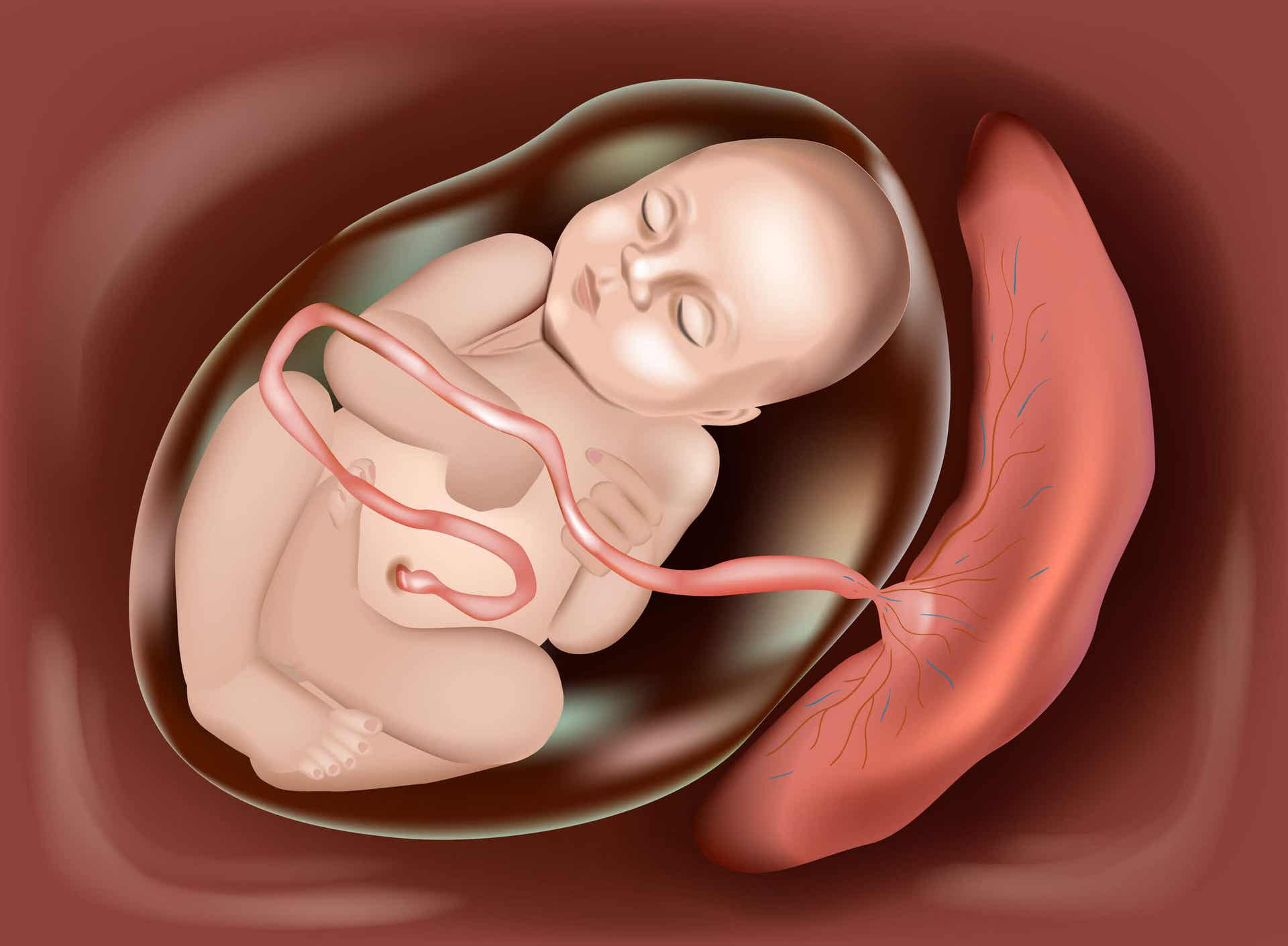Relaxin Hormone: How Does It Influence Pregnancy?

The preparation of a woman’s body for the process of childbirth takes place even in the early stages of pregnancy. Did you know that a large number of substances are involved in this process? Relaxin hormone, in fact, is one of them.
This hormone allows the “relaxation” or softening of ligamentous structures or even the cervix. This facilitates both the growth of the uterus and childbirth itself. Interesting, isn’t it? If you want to know a little more about the relaxin hormone, we invite you to keep reading.
What is the relaxin hormone?

Relaxin’s a hormone that consists of the union of several amino acids. Before pregnancy, a structure called the corpus luteum–which forms on the surface of the ovary after ovulation–is responsible for its production. Afterward, the placenta takes over the production of this important substance.
One interesting fact is that this hormone isn’t exclusive to women. In men, the prostate produces it and it’s possible to find it in semen. It’s likely to facilitate the development of spermatozoa and the fertilization process as such.
Find out more: Hormones During Pregnancy: What You Need to Know
The relaxin hormone and its functions within pregnancy
Most of relaxin’s functions have to do with facilitating labor once the time comes. For this reason, its concentrations are usually higher during a large part of pregnancy. Below, we’ll briefly discuss some of the most important effects of this substance.
1. Inhibiting uterine contractions
The uterine muscle (the myometrium, which forms the intermediate layer of this organ) grows a lot during each week of pregnancy. It’s also susceptible to contracting in response to various stimuli, including the presence of oxytocin, which occurs during labor.
However, in order to avoid contractions that are capable of hindering the baby’s proper development, the release of relaxin hormone coincides with a decrease in myometrial activity. Of course, it’s not the only substance involved, as progesterone also serves a similar function.
2. Decrease collagen production
Did you know that collagen’s one of the most abundant proteins in the human body? It’s part of the connective tissue, which is found in a variety of organs and systems. Mainly, it provides support to many structures, as a kind of “base” on which organs can develop or support themselves.
It’s therefore logical that collagen forms an integral part of ligaments. This allows these structures to be “softened” to a certain extent and their flexibility to be increased. The most important consequence is that it facilitates delivery, especially if the babies are large at birth.
3. The relaxin hormone and softening of the cervix

This function’s closely related to the previous one, as both make it easier for vaginal or natural childbirth to take place in the best possible way.
The cervix is the lower portion of the uterus which, in fact, extends slightly along the upper part of the vagina. This structure must gradually dilate to allow the baby to come out. Can you imagine how difficult birth would be without the cervix being flexible enough? Relaxin, in conjunction with other substances, helps make the process as smooth as possible.
Find out more: The Moment after Childbirth: When a Mother Sees Her Baby for the First Time
Is the administration of the relaxin hormone effective?
Although its effects on the human body have been demonstrated, the administration of synthetic relaxin as a method to facilitate labor hasn’t yet been proven.
In this regard, a study carried out by the Cochrane team showed that, so far, there isn’t enough evidence to affirm that it helps induce labor or prepare the body for it.
This doesn’t mean that the information we’ve discussed isn’t valid. The fact that the administration of relaxin as a drug doesn’t demonstrate significant effects doesn’t mean that relaxin produced in the placenta or corpus luteum doesn’t produce its natural effects.
Relaxin, an important hormone
It’s clear that pregnancy’s a very complex and beautiful process that involves many substances so that everything can take place as it should.
The relaxin hormone is only a small but important part of this stage in women’s lives, and although it’s not essential that you know it in-depth, it’s interesting to know what happens in the body during these special months.
The preparation of a woman’s body for the process of childbirth takes place even in the early stages of pregnancy. Did you know that a large number of substances are involved in this process? Relaxin hormone, in fact, is one of them.
This hormone allows the “relaxation” or softening of ligamentous structures or even the cervix. This facilitates both the growth of the uterus and childbirth itself. Interesting, isn’t it? If you want to know a little more about the relaxin hormone, we invite you to keep reading.
What is the relaxin hormone?

Relaxin’s a hormone that consists of the union of several amino acids. Before pregnancy, a structure called the corpus luteum–which forms on the surface of the ovary after ovulation–is responsible for its production. Afterward, the placenta takes over the production of this important substance.
One interesting fact is that this hormone isn’t exclusive to women. In men, the prostate produces it and it’s possible to find it in semen. It’s likely to facilitate the development of spermatozoa and the fertilization process as such.
Find out more: Hormones During Pregnancy: What You Need to Know
The relaxin hormone and its functions within pregnancy
Most of relaxin’s functions have to do with facilitating labor once the time comes. For this reason, its concentrations are usually higher during a large part of pregnancy. Below, we’ll briefly discuss some of the most important effects of this substance.
1. Inhibiting uterine contractions
The uterine muscle (the myometrium, which forms the intermediate layer of this organ) grows a lot during each week of pregnancy. It’s also susceptible to contracting in response to various stimuli, including the presence of oxytocin, which occurs during labor.
However, in order to avoid contractions that are capable of hindering the baby’s proper development, the release of relaxin hormone coincides with a decrease in myometrial activity. Of course, it’s not the only substance involved, as progesterone also serves a similar function.
2. Decrease collagen production
Did you know that collagen’s one of the most abundant proteins in the human body? It’s part of the connective tissue, which is found in a variety of organs and systems. Mainly, it provides support to many structures, as a kind of “base” on which organs can develop or support themselves.
It’s therefore logical that collagen forms an integral part of ligaments. This allows these structures to be “softened” to a certain extent and their flexibility to be increased. The most important consequence is that it facilitates delivery, especially if the babies are large at birth.
3. The relaxin hormone and softening of the cervix

This function’s closely related to the previous one, as both make it easier for vaginal or natural childbirth to take place in the best possible way.
The cervix is the lower portion of the uterus which, in fact, extends slightly along the upper part of the vagina. This structure must gradually dilate to allow the baby to come out. Can you imagine how difficult birth would be without the cervix being flexible enough? Relaxin, in conjunction with other substances, helps make the process as smooth as possible.
Find out more: The Moment after Childbirth: When a Mother Sees Her Baby for the First Time
Is the administration of the relaxin hormone effective?
Although its effects on the human body have been demonstrated, the administration of synthetic relaxin as a method to facilitate labor hasn’t yet been proven.
In this regard, a study carried out by the Cochrane team showed that, so far, there isn’t enough evidence to affirm that it helps induce labor or prepare the body for it.
This doesn’t mean that the information we’ve discussed isn’t valid. The fact that the administration of relaxin as a drug doesn’t demonstrate significant effects doesn’t mean that relaxin produced in the placenta or corpus luteum doesn’t produce its natural effects.
Relaxin, an important hormone
It’s clear that pregnancy’s a very complex and beautiful process that involves many substances so that everything can take place as it should.
The relaxin hormone is only a small but important part of this stage in women’s lives, and although it’s not essential that you know it in-depth, it’s interesting to know what happens in the body during these special months.
This text is provided for informational purposes only and does not replace consultation with a professional. If in doubt, consult your specialist.








